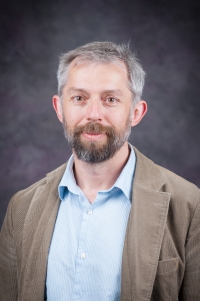Yurii Maravin
Professor
 11 Cardwell Hall
11 Cardwell Hall
(785) 532-1638
maravin@k-state.edu
Personal Webpage
Ph.D. Southern Methodist University, 2002
Research Area
Experimental High Energy Physics
- Higgs boson physics
- Search for new phenomena
I study physics at the 10-18 m scale of the quantum universe using data collected by the CMS detector at the Large Hadron Collider (LHC), located near Geneva, Switzerland. All our knowledge of fundamental particles and their interactions, summarized in the theory that we refer to as standard model, unfortunately does not provide answers to a number of outstanding puzzles in physics, such as: what is the origin of dark matter, why do we have three generations of matter, why do particles have particular masses, and why are some of them so light, while some are heavier than the atoms. Most importantly, what makes Higgs boson so light, while quantum corrections predict its mass to diverge to infinity. A number of "extensions" of the standard model exist to breach from its low-energy approximation roots toward a more grand theory that would describe our Universe at the microscopic level. The newly discovered Higgs boson plays a very important role in finding out which of those extensions might be the right ones. Thus, my research program focuses on studying the newly discovered Higgs boson and using it as a tool to search for new physics in LHC collision data.
My research group is leading the efforts to study the properties of the Higgs boson couplings to heavy gauge bosons, and aim to extend the study to measure Higgs boson couplings to fermions.
My group is also active in CMS hardware operations and upgrade efforts. I am currently co-leading the CMS HCAL Calibration group, charged to ensure optimal measurement of hadron showers with the CMS detector. We are active in the Phase I HCAL upgrade, and have begun working toward a novel ultra-fast timing detector for the Phase II upgrade, aiming to measure the timing information for particles with 30 ps resolution. This detector will be essential to unlocking the true potential of the CMS detector in the high-luminosity regime of the upgraded LHC complex in the next decade.
Research Support
- Department of Energy
Recent Selected Publications
CMS Collaboration, "Search for chargino-neutralino production in events with Higgs and W bosons using 137 fb-1 of proton-proton collisions at √s = 13 TeV," JHEP 10 (2021) 045. [link]
CMS Collaboration, "Measurements of the Electroweak Diboson Production Cross Sections in Proton-Proton Collisions at s=5.02 TeV Using Leptonic Decays," Phys. Rev. Lett. 127, 191801 (2021). [link]
CMS Collaboration, "Measurement of the electroweak production of Zγ and two jets in proton-proton collisions at √s=13 TeV and constraints on anomalous quartic gauge couplings," Phys. Rev. D 104, 072001 (2021). [link]
CMS Collaboration, "Study of Z boson plus jets events using variables sensitive to double-parton scattering in pp collisions at 13 TeV," JHEP 10 (2021) 176. [link]
CMS Collaboration, "Measurements of the pp → W±γγ and pp → Zγγ cross sections at √s = 13 TeV and limits on anomalous quartic gauge couplings," JHEP 10 (2021) 174. [link]
Full publication list